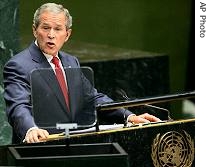-
(单词翻译:双击或拖选)
By Paula Wolfson
New York
19 September 2006
 President Bush addresses the 61st session of the UN General Assembly at UN headquarters, Tuesday, September 19, 2006 |
||
-----
The president spoke1 of a struggle between extremists and moderates who seek peace. He said the future of the world is at stake.
"We must stand with democratic leaders and moderate reformers across the broader Middle East," he said. "We must give voice to the hopes of decent men and women who want for their children the same things we want for ours."
In an address on the first day of General Assembly debate, Mr. Bush spoke of a world beyond terror, where freedom and respect for human rights are the norm.
In doing so, he actually spoke to two audiences: the diplomats2 gathered in the General Assembly chamber3, and the people of the Middle East.
He said the United States does not seek conflict in the region, but wants a better life for all, a life where all the people of the region are free.
"My country desires peace. Extremists in your midst spread propaganda claiming that the West is engaged in a war against Islam. This propaganda is false and its purpose is to confuse you and justify4 acts of terror," said Mr. Bush.
Mr. Bush said the goal is to help build tolerant and hopeful societies for people of all faiths. He told the people of Iraq that the United States stands with them, and assured Afghans that their country will not be turned over to terrorists and extremists.
He spoke of his desire to help the Lebanese rebuild their country, and voiced support for moderate Palestinian leaders seeking a future of peace.
His tone shifted when he turned to Iran and Syria, where he said governments are denying the people the freedom they deserve. He said America respects Iran and its rich culture and history, but added its leaders are refusing to let the Iranian people taste freedom and reach their full potential.
"The greatest obstacle to this future is that your rulers have chosen to deny you liberty and to use your nation's resources to fund terrorism and fuel extremism and pursue nuclear weapons," commented Mr. Bush.
The president also had harsh words for the government of Sudan, which has refused to allow the deployment5 of a U.N. administered peacekeeping force in the troubled Darfur region. Mr. Bush told the people of Darfur that they have suffered unspeakable violence and said something must be done.
"If the Sudanese government does not approve this peacekeeping force quickly, the United Nations must act," he said. "Your lives and the credibility of the United Nations are at stake."
The president then announced that he has named a special envoy6 to Sudan. He is Andrew Natsios, the former head of the U.S. Agency for International Development.
 收听单词发音
收听单词发音
1
spoke

|
|
| n.(车轮的)辐条;轮辐;破坏某人的计划;阻挠某人的行动 v.讲,谈(speak的过去式);说;演说;从某种观点来说 | |
参考例句: |
|
|
|
2
diplomats

|
|
| n.外交官( diplomat的名词复数 );有手腕的人,善于交际的人 | |
参考例句: |
|
|
|
3
chamber

|
|
| n.房间,寝室;会议厅;议院;会所 | |
参考例句: |
|
|
|
4
justify

|
|
| vt.证明…正当(或有理),为…辩护 | |
参考例句: |
|
|
|
5
deployment

|
|
| n. 部署,展开 | |
参考例句: |
|
|
|
6
envoy

|
|
| n.使节,使者,代表,公使 | |
参考例句: |
|
|
|















